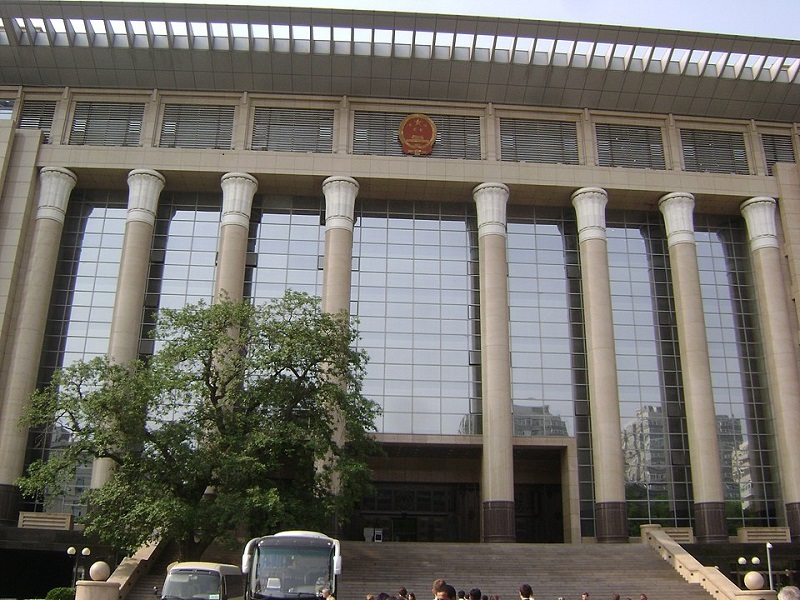One of China’s top courts has encouraged judges to hear climate-related cases and weigh up carbon impacts to help the country achieve its emission reduction goals.
In a significant legal intervention, the Supreme People’s Court issued new guidelines that say judges should balance development and corporate emission reduction when ruling on lawsuits.
The 24-article document gives courts across China the green light to hear cases related to energy conservation and emission reduction, low-carbon technology, carbon trading and green finance, and to promote climate change mitigation and adaptation.
It sets out 11 examples of climate-related lawsuits that judges might encounter, including contractual issues, implementation of carbon emission quotas, air pollution liability and deforestation. The document says courts should focus on the carbon trading market, in particular, which has been the subject of a wide variety of legal disputes in recent years.
Liu Zhumei, chief environmental judge at the Supreme People’s Court adjudication tribunal for environment and resources, told media that the new guidelines are a key step to implementing environmental protection pledges in the report to the 20th National Congress of the Communist Party of China.
This promised to boost low-carbon industries and improve the system for market-based allocation of resources, as well as reduce environmental harms.
“The guideline is also the first judicial document made by the top court to regulate case handling on the carbon peak and carbon,” she added.
‘Dual carbon’ goals
President Xi Jinping recently reaffirmed a pledge that China would peak its carbon dioxide emissions before 2030 and be carbon neutral before 2060, known as the “dual carbon” goals.
But experts say decarbonising the country will be a major challenge.
A recent report by Global Energy Monitor and the Centre for Research on Energy and Clean Air found permit approval, construction and new project announcements for coal in China accelerated “dramatically” last year, with new permits reaching the highest level since 2015. Coal power capacity starting construction in China was six times bigger than all the rest of the world combined.
Central government appears to be supportive of the new projects, the report finds, with the energy regulator aiming to have 165GW of coal power construction starting in 2022-23. Chinese provinces too are expected to focus their energies on a mix of both coal and renewable power in the coming year.
Japan’s ‘green transformation’ would derail the energy transition in Asia
China signalled the continued importance of coal to its domestic energy security in a government work report presented at the beginning of the National People’s Congress annual meeting on Sunday.
However, minister of ecology and environment Huang Runqiu also recently said the development of industries with high energy consumption and emissions, projects in areas with fragile ecosystems and the transfer of projects with high emissions from eastern China to the west of the country would be “highly restricted”, according to China Daily.
Whether the judiciary can temper the country’s coal drive remains to be seen.
Dimitri de Boer, Asia regional director of programmes for environmental law NGO ClientEarth, told Climate Home that the involvement of courts in implementing the dual carbon goals would likely “increase the level of scrutiny on newly proposed high emissions projects, and help to ensure a smooth low-carbon energy transition”.
Proactive role
Climate litigation has been difficult in China because, unlike many other countries, it does not have specific legislation to combat climate change. But the judiciary has signalled a willingness to engage with the issue.
The 2021 Kunming Declaration called on courts to play a proactive role in tackling climate change and encouraged greater coordination of domestic and foreign rule of law.
A judgment on cryptocurrency mining last year was the first time a ruling of final effect explicitly mentioned China’s carbon peaking and carbon neutrality goals, and experts think it is unlikely to be the last.
Lu Xu, senior lecturer in property law at Lancaster University’s law school, said the new guidelines largely summarised what the judicial system in China was already doing but do send a strong signal to the lower courts.
“Guidelines are not law,” he said. “But lower courts will understandably pay attention to all of them. In turn this will create pressure on litigants to accept or accommodate the values of the guidelines, as lower courts would not want to decide cases in blatant defiance to them.”
